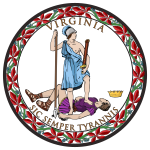| Elections in Virginia |
|---|
 |
Sixteen of the nineteen Virginia incumbents were re-elected.
| District | Incumbent | Party | First elected | Result | Candidates |
|---|---|---|---|---|---|
| Virginia 1 | Robert Rutherford | Anti-Administration | 1793 | Incumbent re-elected to a new party. Democratic-Republican gain. | √ Robert Rutherford (Democratic-Republican) [1] Daniel Morgan (Federalist) |
| Virginia 2 | Andrew Moore | Anti-Administration | 1789 | Incumbent re-elected to a new party. Democratic-Republican gain. | √ Andrew Moore (Democratic-Republican) [1] |
| Virginia 3 | Joseph Neville | Anti-Administration | 1793 | Incumbent lost re-election. New member elected. Democratic-Republican gain. | √ George Jackson (Democratic-Republican) [1] Joseph Neville (Democratic-Republican) Thomas Wilson John Skidmore |
| Virginia 4 | Francis Preston | Anti-Administration | 1793 | Incumbent re-elected to a new party. Democratic-Republican gain. | √ Francis Preston (Democratic-Republican) [1] Arthur Campbell |
| Virginia 5 | George Hancock | Pro-Administration | 1793 | Incumbent re-elected to a new party. Federalist gain. | √ George Hancock (Federalist) [1] |
| Virginia 6 | Isaac Coles | Anti-Administration | 1793 | Incumbent re-elected to a new party. Democratic-Republican gain. | √ Isaac Coles (Democratic-Republican) [1] Simon Crae MacMahon Matthew Clay (Democratic-Republican) |
| Virginia 7 | Abraham B. Venable | Anti-Administration | 1790 | Incumbent re-elected to a new party. Democratic-Republican gain. | √ Abraham B. Venable (Democratic-Republican) 61.0% Thomas Woodson 19.8% Joseph Wyatt 18.9% Peter Johnson 0.2% William Wilson 0.1% |
| Virginia 8 | Thomas Claiborne | Anti-Administration | 1793 | Incumbent re-elected to a new party. Democratic-Republican gain. | √ Thomas Claiborne (Democratic-Republican) [1] Jesse Brown Samuel Hopkins Samuel Goode (Democratic-Republican) Sterling Edmunds |
| Virginia 9 | William B. Giles | Anti-Administration | 1790 | Incumbent re-elected to a new party. Democratic-Republican gain. | √ William B. Giles (Democratic-Republican) [1] |
| Virginia 10 | Carter B. Harrison | Anti-Administration | 1793 | Incumbent re-elected to a new party. Democratic-Republican gain. | √ Carter B. Harrison (Democratic-Republican) [1] |
| Virginia 11 | Josiah Parker | Pro-Administration | 1789 | Incumbent re-elected to a new party. Federalist gain. | √ Josiah Parker (Federalist) [1] Robert Cowper |
| Virginia 12 | John Page | Anti-Administration | 1789 | Incumbent re-elected to a new party. Democratic-Republican gain. | √ John Page (Democratic-Republican) [1] |
| Virginia 13 | Samuel Griffin | Pro-Administration | 1789 | Incumbent retired. New member elected. Democratic-Republican gain. The loser unsuccessfully contested the election. | √ John Clopton (Democratic-Republican) [1] Burwell Bassett (Democratic-Republican) Miles Selden Meriwether Jones |
| Virginia 14 | Francis Walker | Anti-Administration | 1793 | Incumbent retired. New member elected. Democratic-Republican gain. | √ Samuel J. Cabell (Democratic-Republican) [1] |
| Virginia 15 | James Madison Jr. | Anti-Administration | 1789 | Incumbent re-elected to a new party. Democratic-Republican gain. | √ James Madison Jr. (Democratic-Republican) [1] |
| Virginia 16 | Anthony New | Anti-Administration | 1793 | Incumbent re-elected to a new party. Democratic-Republican gain. | √ Anthony New (Democratic-Republican) [1] |
| Virginia 17 | Richard Bland Lee | Pro-Administration | 1789 | Incumbent lost re-election. New member elected. Democratic-Republican gain. | √ Richard Brent (Democratic-Republican) [1] Richard Bland Lee (P) |
| Virginia 18 | John Nicholas | Anti-Administration | 1793 | Incumbent re-elected to a new party. Democratic-Republican gain. | √ John Nicholas (Democratic-Republican) [1] |
| Virginia 19 | John Heath | Anti-Administration | 1793 | Incumbent re-elected to a new party. Democratic-Republican gain. | √ John Heath (Democratic-Republican) [1] |




